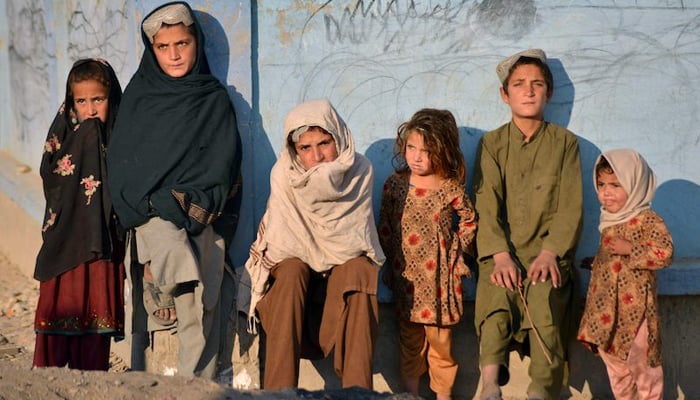Rare joint effort between Pakistan, Israel helps Afghan children: report
Retinoblastoma is rare malignant eye cancer most commonly found in young children up to age 5
KABUL: With Afghanistan unable to treat the potentially deadly eye cancer retinoblastoma, Israel’s Sheba Medical Center initiated and is funding a programme to transport Afghan children with the disease into Pakistan for treatment, foreign media reported.
Children in Afghanistan are being given a chance to survive a potentially deadly eye cancer through an extraordinary international effort led by an Israeli team working with medical centers in Pakistan. Neither Pakistan nor Afghanistan has formal diplomatic relations with Israel.
Doctors from Sheba Medical Center, Israel’s biggest hospital, teamed up with Pakistani medical centers to create the Retinoblastoma Silk Road Program, in which Afghan children diagnosed with the deadly cancer are transported over the border into Pakistan for lifesaving treatment.
Retinoblastoma is a rare malignant eye cancer most commonly found in young children up to age 5. In high-income countries, where children with the disease can receive a variety of treatments, almost all survive, although many lose the affected eye. However, in low-income countries, survival rates are below 50%. The World Health Organization is aiming for a 60% global survival rate by 2030.
In Afghanistan, about 100 new cases of the cancer are diagnosed every year, but the country lacks the medical infrastructure to administer the necessary treatments. Prof. Ido (Didi) Fabian, an expert in ocular tumor treatment at the Sheba Medical Center, spearheaded the effort to transport Afghan children with the disease into Pakistan for treatment. He had been conducting a study into the cancer in 2017 when he noticed a particularly strong need for help in Afghanistan.
However, after the Taliban took control of Afghanistan in 2021, it became much more difficult for Afghans to obtain permission to leave the country. Fabian felt he had to help and saw an opportunity to transport children and their families into Pakistan to receive treatment.
Fabian coordinated with doctors from several Pakistani medical centers but ended up working primarily with the Children’s Hospital in Lahore, Pakistan’s second-largest city. “For all those patients who are diagnosed with retinoblastoma in Afghanistan, unfortunately, local facilities are not available to offer treatment for these little kids. The treatment is readily available here in Pakistan,” said Dr. Huma Zafar, a pediatric oncologist with the Children’s Hospital.
Because of the hurdles Afghans face when traveling, Fabian requested and received funding from the Sheba Medical Center to organize three teams. The first is a Sheba team based in Israel that helps coordinate the program. The second team, in Afghanistan, is tasked with driving the children and their families to the capital, Kabul, to obtain special permission to enter Pakistan for medical treatment. That team then drives the families to the Pakistani border. At the border, on the Pakistani side, the third team receives them, delivers them to Lahore, and finds accommodation for them during the treatment period.
“Accommodation issues and other logistics—traveling and staying here for a long, long time—these were a few challenges with the families we were already facing,” Zafar said.
-
 Katie Price Drama Escalates As Family Stays In Touch With Ex JJ Slater
Katie Price Drama Escalates As Family Stays In Touch With Ex JJ Slater -
 Critics Target Palace Narrative After Andrew's Controversy Refuses To Die
Critics Target Palace Narrative After Andrew's Controversy Refuses To Die -
 Sarah Ferguson’s Delusions Take A Turn For The Worse: ‘She’s Been Deserted’
Sarah Ferguson’s Delusions Take A Turn For The Worse: ‘She’s Been Deserted’ -
 ICE Agents 'fake Car Trouble' To Arrest Minnesota Man, Family Says
ICE Agents 'fake Car Trouble' To Arrest Minnesota Man, Family Says -
 Camila Mendes Reveals How She Prepared For Her Role In 'Idiotka'
Camila Mendes Reveals How She Prepared For Her Role In 'Idiotka' -
 China Confirms Visa-free Travel For UK, Canada Nationals
China Confirms Visa-free Travel For UK, Canada Nationals -
 Inside Sarah Ferguson, Andrew Windsor's Emotional Collapse After Epstein Fallout
Inside Sarah Ferguson, Andrew Windsor's Emotional Collapse After Epstein Fallout -
 Bad Bunny's Star Power Explodes Tourism Searches For His Hometown
Bad Bunny's Star Power Explodes Tourism Searches For His Hometown -
 Jennifer Aniston Gives Peek Into Love Life With Cryptic Snap Of Jim Curtis
Jennifer Aniston Gives Peek Into Love Life With Cryptic Snap Of Jim Curtis -
 Prince Harry Turns Diana Into Content: ‘It Would Have Appalled Her To Be Repackaged For Profit’
Prince Harry Turns Diana Into Content: ‘It Would Have Appalled Her To Be Repackaged For Profit’ -
 Prince William's Love For His Three Children Revealed During Family Crisis
Prince William's Love For His Three Children Revealed During Family Crisis -
 Murder Suspect Kills Himself After Woman Found Dead In Missouri
Murder Suspect Kills Himself After Woman Found Dead In Missouri -
 Sarah Ferguson's Plea To Jeffrey Epstein Exposed In New Files
Sarah Ferguson's Plea To Jeffrey Epstein Exposed In New Files -
 Prince William Prepares For War Against Prince Harry: Nothing Is Off The Table Not Legal Ways Or His Influence
Prince William Prepares For War Against Prince Harry: Nothing Is Off The Table Not Legal Ways Or His Influence -
 'How To Get Away With Murder' Star Karla Souza Is Still Friends With THIS Costar
'How To Get Away With Murder' Star Karla Souza Is Still Friends With THIS Costar -
 Pal Reveals Prince William’s ‘disorienting’ Turmoil Over Kate’s Cancer: ‘You Saw In His Eyes & The Way He Held Himself’
Pal Reveals Prince William’s ‘disorienting’ Turmoil Over Kate’s Cancer: ‘You Saw In His Eyes & The Way He Held Himself’




